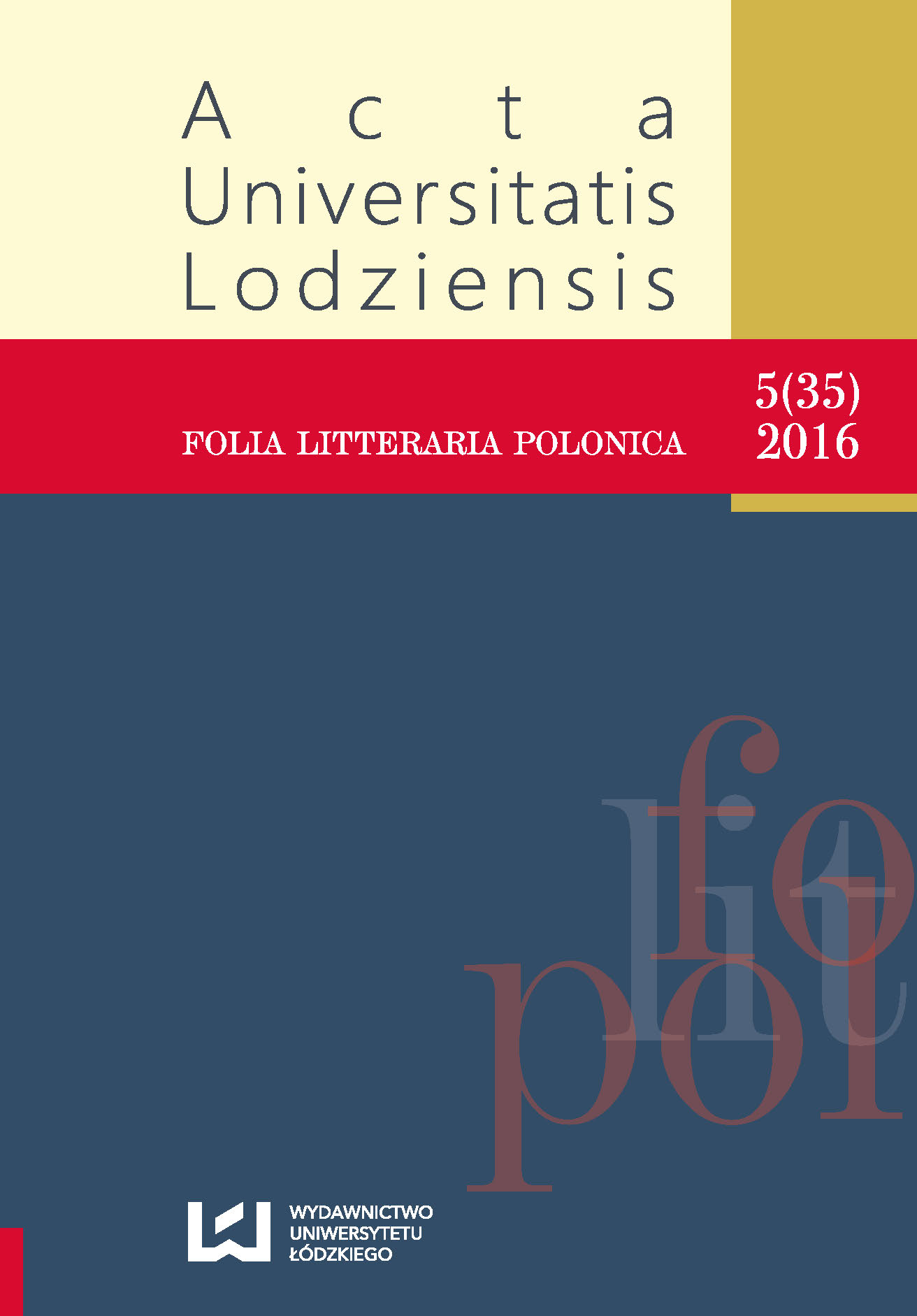The Persuasiveness of a Message and the Problem of Legitimacy
DOI:
https://doi.org/10.18778/1505-9057.35.05Słowa kluczowe:
persuasiveness, political communication, the ideal speech situation, emphasis, the legitimacy of powerAbstrakt
The author analyses several selected speeches of Italian politicians: the founder of the Forza Italia party, Silvio Berlusconi; the founder and leader of the Five Stars Movement, Beppe Grillo; and the current Prime Minister of Italy, Matteo Renzi. The study makes it possible to evaluate whether the conditions for the ideale Sprechsituation (the ideal speech situation) of Jürgen Habermas are fulfilled in analysing the public discourse. Particular attention will be given to the relationship between the persuasiveness of the communication and the problem of legitimacy.
Pobrania
Bibliografia
„Anadiploza” [Entry], in: „Słownik języka polskiego PWN”, http://sjp.pwn.pl/sjp/anadiploza; 2549890 [access: 4.11.2015].
Google Scholar
Arystoteles, „Etyka nikomachejska”, as cited in: Aristotelis, “Ethica Nicomachea”, recognovit F. Susemihl, Teubner, Lipsiae 1880.
Google Scholar
Arystoteles, „Etyka wielka”, in: idem, „Dzieła wszystkie”, Vol. 5, transl. D. Gromska, Wydawnictwo Naukowe PWN, Warsaw 1996, pp. 338–344.
Google Scholar
Baciak P., „Internet – Agora XXI wieku? Rozważanie w świetle teorii demokracji deliberatywnej autorstwa Jürgena Habermasa”, Global Media Journal – Polish Edition 2006, No. 2 (2), pp. 136–139, http://globalmediajournal.collegium.edu.pl/artykuly/jesien%202006/Baciak-Internet%20-%20Agora%20XXI%20wieku.pdf [access: 4.11.2015].
Google Scholar
„Beppe Grillo: humorysta, bloger, polityk”, http://pl.euronews.com/2012/05/22/beppe-grillo-humorysta-bloger-polityk/ [access: 4.11.2015].
Google Scholar
Capek-Habekovič R., Palaich S., “Parola a te!”, Heinle Cengage Learning, Boston 2009.
Google Scholar
“Chi c’è dietro Beppe Grillo? Ritratto di Casaleggio, lo stratega 5Stelle”, http://www.iltempo.it/politica/2012/10/01/chi-c-e-dietro-beppe-grillo-ritratto-di-casaleggio-lo-stratega-5stelle-1.3130 [access: 11.02.2015].
Google Scholar
Cyceron M.T., „O mówcy”, transl. B. Awianowicz, Wydawnictwo Antyk, Warsaw 2011.
Google Scholar
Daconto C., “I 10 politici più importanti del 2014”, http://www.panorama.it/news/politica/i-10-politici-piu-importanti-2014/ [access: 4.11.2015].
Google Scholar
Dziurlikowska I., „Włoska prezydencja pod znakiem rozwoju”, http://www.uniaeuropejska.org/wloska-prezydencja-pod-znakiem-rozwoju [access: 4.11.2015].
Google Scholar
„Emfaza” [Entry], in: „Słownik języka polskiego PWN”, http://sjp.pwn.pl/slowniki/emfaza.html [access: 4.11.2015].
Google Scholar
Felsner K., Helbig H., Manz T., „Arbeitsbuch Lyrik”, Akademie Verlag GmbH, Berlin 2012.
Google Scholar
Fras J., „Komunikacja polityczna. Wybrane zagadnienia gatunków i języka wypowiedzi”, Wydawnictwo Uniwersytetu Wrocławskiego, Wroclaw 2005.
Google Scholar
Gimmler A., “Deliberative Democracy, the Public Sphere and the Internet”, Philosophy & Social Criticism 2001, Vol. 27, pp. 21–39.
Google Scholar
Habermas J., „Vorstudien und Ergänzungen zur Theorie des kommunikativen Handelns”, Frankfurt am Main 1984.
Google Scholar
Kujawska-Lis E., „Dickensowskie anafory w polskim przekładzie”, Prace Językoznawcze 2009, Issue 11, Uniwersytet Warmińsko-Mazurski, pp. 115–133.
Google Scholar
“Matteo Renzi, la mia storia. Chi sono”, http://www.matteorenzi.it/chi-sono/ [access: 4.11.2015].
Google Scholar
Kwintylian, „Kształcenie mówcy. Księgi I, II i X”, transl. and ed. M. Brożek, Ossolineum, Wroclaw 1951.
Google Scholar
Nieć M., „Komunikowanie społeczne i media. Perspektywa politologiczna”, LEX Grupa Wolters Kluwer, Warsaw 2010.
Google Scholar
Pisarek W., „Perswazja – jak ją widzą, jak ją piszą”, in: „Język perswazji publicznej”, ed. K. Mosiołek-Kłosińska, T. Zgółka, Wydawnictwo Poznańskie, Poznan 2003, pp. 9–17.
Google Scholar
„Silvio Berlusconi”, http://ludzie.wprost.pl/sylwetka/Silvio-Berlusconi/ [access: 4.11.2015].
Google Scholar
“The world’s 50 most powerful blogs”, http://www.theguardian.com/technology/2008/mar/09/blogs [access: 4.11.2015].
Google Scholar
Zdunkiewicz D., „Językowe środki perswazji w homiliach (na przykładzie tekstów Jana Pawła II)”, in: „Język a kultura”, Vol. 4 „Funkcje języka i wypowiedzi”, ed. J. Bartmiński, R. Grzegorczykowa, Wiedza o Kulturze, Wroclaw 1991, pp. 149–157.
Google Scholar
Żardecka-Nowak M., „Demokracja deliberatywna jako remedium na ponowoczesny kryzys legitymizacji władzy”, Teka Komisji Politologii i Stosunków Międzynarodowych. Polska Akademia Nauk Oddział w Lublinie 2008, Vol. III, pp. 29–40, http://www.pan-ol.lublin.pl/wydawnictwa/TPol3/Zardecka.pdf [access: 4.11.2015].
Google Scholar
http://archivio.internazionale.it/news/unione-europea/2014/07/02/il-discorso-integrale-di-matteorenzi-al-parlamento-europeo [access: 4.11.2015].
Google Scholar
http://www.beppegrillo.it/videos/0_s49orvgm.php [access: 4.11.2015].
Google Scholar
http://www.repubblica.it/2004/a/sezioni/politica/festaforza/discesa/discesa.html [access: 4.11.2015].
Google Scholar
https://www.youtube.com/watch?v=cbkaEeG721Y [access: 4.11.2015].
Google Scholar
https://www.youtube.com/watch?v=go4FPwf0aVI [access: 4.11.2015].
Google Scholar
Pobrania
Opublikowane
Jak cytować
Numer
Dział
Licencja

Utwór dostępny jest na licencji Creative Commons Uznanie autorstwa – Użycie niekomercyjne – Bez utworów zależnych 4.0 Międzynarodowe.











